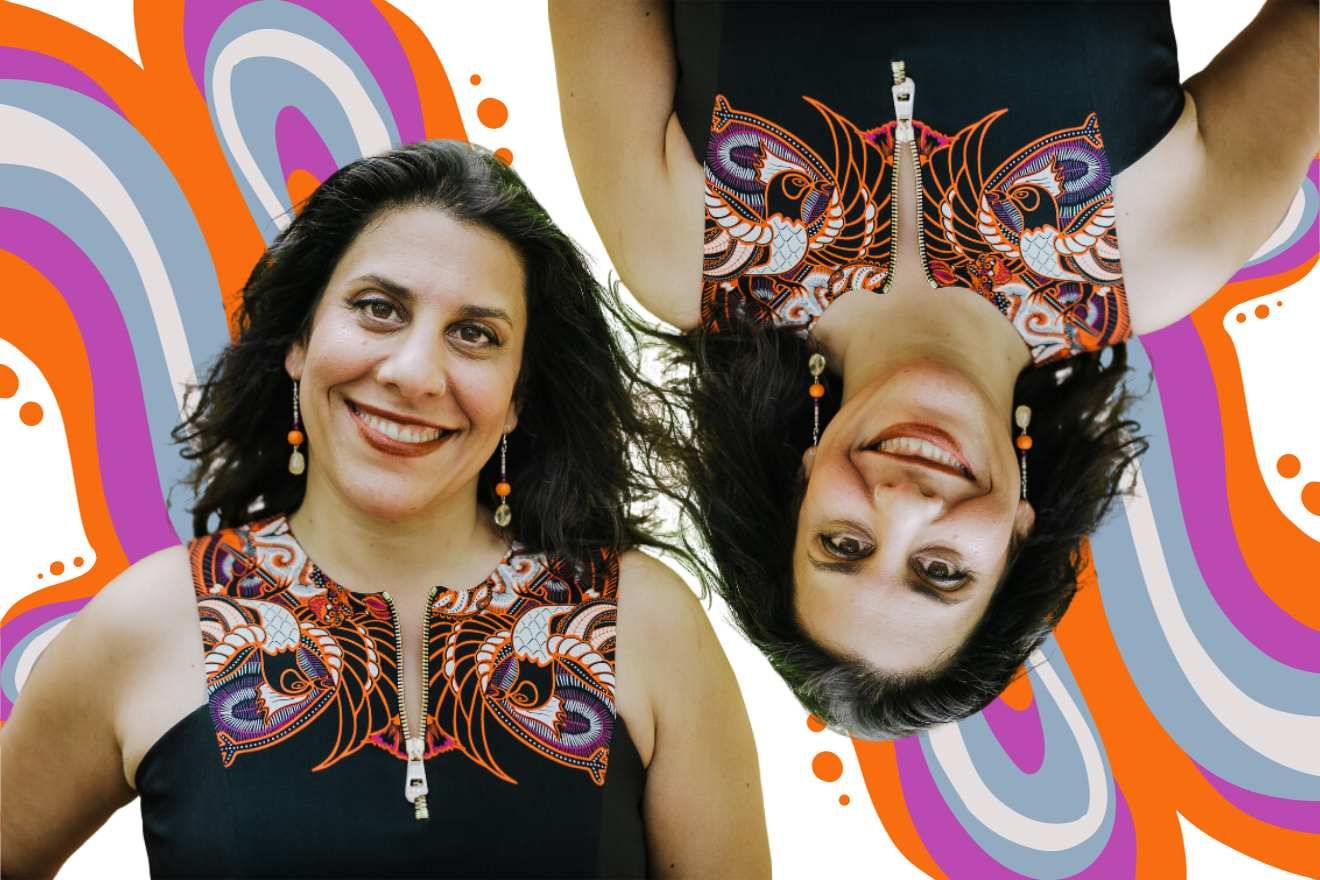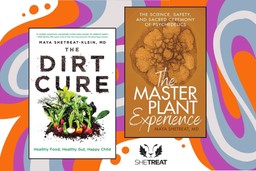Maya Shetreat, MD, is a neurologist, herbalist, urban farmer, and author of The Dirt Cure and The Master Plant Experience: The Science, Safety and Sacred Ceremony of Psychedelics.
She has been featured in the New York Times, The Telegraph, NPR, Sky News, The Dr. Oz Show, and more. Dr. Maya is the founder of the Terrain Institute, where she teaches earth-based programs for transformational healing. These include professional training programs for psychedelic-assisted approaches. She works and studies with indigenous communities and healers from around the world, and is a lifelong student of ethnobotany, plant healing, and the sacred.
In this interview, we spoke with Dr. Maya about her background in neurology and her spiritual discovery. She shares her thoughts about paying respects to Indigenous communities in psychedelic medicine. We speak about how plant medicine can help the epidemic of loneliness. And, she also shares her concerns and opportunities for the future of psychedelic research.
Dr. Maya’s Neurology Background Helping Others Heal Spiritually
Dr. Maya is a conventionally trained pediatric and adult neurologist. During her medical practice, she used an integrative way to treat neurological issues including conventional means, herbs, foods, and supplements.
“Some People Who Just Did Not Get Better.”
She was seeing people from all over the world who had been to different doctors and medical centers. They had tried many treatments for their neurological, psychiatric, and behavioral issues.
Dr. Maya noticed people tended to heal in a certain way:
“I was doing all kinds of things and I started to see…that people have a certain trajectory when they’re healing. [S]ome people will heal a little faster. Some people will heal and improve a little more slowly, but most people follow this particular kind of trajectory. And what I found was that there were some people who just did not get better.”
She started thinking about the people who were not recovering—not finding the kind of results they wanted or needed. She knew not everyone could heal completely from any condition but that everyone could improve.
Spiritual Well-Being Was Not Being Addressed With Integrative Medicine
Dr. Maya had done a lot of training including many years in conventional medicine and integrative practice. She realized that there was a different component that wasn’t really being addressed. She discovered that spiritual well-being is just as important as physical, mental, and emotional health for a happy, healthy life:
“[S]ometimes people have experiences or issues in their families or lineage that get in the way of their ability to live a…full, happy, healthy life. [A] major way to address that and to help them address that for themselves is to look at them through a spiritual lens.”
It made a huge difference in the work that she does for people who have all different kinds of conditions. From ADHD and depression to addiction—she could help them more holistically.
Spirituality Is Innate to Every Person, Not Synonymous With Organized Religion
Dr. Maya shared that taking or integrating a spiritual approach is critical. She believes that there’s a huge gap in spirituality because of the conventional thinking used when we have a problem. We think we need to treat it through physical or mental means. At the same time, the meaning of spirituality has become synonymous with religion.
“[When] people hear the word spiritual or spirituality…they either think conventional religion or they think new age BS. But spirituality is something innate to every single person and the way the language that we may use to describe it is incredibly diverse and variable…There’s not one language to describe spirituality.”
She stressed that we’ve become programmed to believe that everything is both material and physical. She gave the example of depression and how it’s fundamentally not true that it’s just a neurotransmitter problem.
Instead, it’s a result that has manifested physically, mentally, and emotionally. It’s the result of a relationship between the person, their experience, genetics, epigenetics, and their circumstances.
Paying Indigenous Communities Deserved Respect in Psychedelic Medicine
During her journey of learning, Dr. Maya traveled worldwide. She learned from plants, teachers, elders, and Indigenous communities from Ecuador and Mexico to Australia and Africa.
We asked for her thoughts on how we can pay respect and honor their wisdom as psychedelic medicine continues to integrate with the rest of the population.
She doesn’t believe there is a clear and easy answer, but that it can be simple. Here are her thoughts:
“The answer is to talk to [Indigenous] communities. Listen, learn to listen, and come with respect to the wisdom holders who have protected and put lives on the line to be custodians of this knowledge and this relationship for millennia.”
She stresses that conversations are key to ensuring this is properly done.
“[W]hat it comes down to is asking for them to share their wisdom and asking them what we can offer them in return. And it’s going to vary because indigenous people and indigenous communities are incredibly diverse and variable…and their needs and desires will be variable. And that’s why conversations need to happen. But they need to happen with reverence and respect and reciprocity.”
Read more about equity and Indigenous plant medicine traditions.
The Importance of Connection for Our Health and Well-Being
In The Master Plant Experience, Dr. Maya wrote about the importance of relationships and connection for our health and well-being. We asked her how ancient and sacred practices deepen our connections when using plant medicine.
She used the example of how writing the book was a transformative experience. When she started writing the book, she thought she already knew what she was going to say. But the information she discovered during her research became so much more:
“Writing the book itself was a spiritual mystical and psychedelic experience. And I don’t say that because of anything I ingested…I transformed. I would say I was turned inside out. I felt like a different person after writing it and people who knew me well also felt I was a different person after writing it. Very unexpected.”
Neurons Mimic Our Social Connections
Dr. Maya explained that the way that we understand connection through master plants and psychedelics reverberates on many levels, from cellular and neurological to communal levels.
The U.S. Surgeon General recently released an advisory about our epidemic of loneliness and isolation. There are many people right now who are feeling lonely, depressed, and isolated. And their neurons are mimicking the way they are feeling.
Dr. Maya shared that when we feel lonely and depressed, our neurons become more isolated. They physically have fewer synaptic connections to other neurons. The brain of a person who has experienced trauma is structurally different—it is less connected with less plasticity.
Mitochondria Mimic Our Interactions With Others
Mitochondria are the energy makers of the cells; Dr. Maya explained how they also mimic our social connections.
Healthy mitochondria are elongated, branched, and in contact with other branched mitochondria. But when they are in a cell that is in danger mode, they look like meatballs.
“[Y]ou can look at mitochondria in a person who feels like they are in a state of unsafe danger or isolation…you can see that on a mitochondrial level, [they are] not in connection. The mitochondria don’t connect to other mitochondria. They’re not communicating. They’re not exchanging nutrients. They’re not releasing waste in the same way.”
Psychedelics and Master Plants Can Increase Neuronal and Brain Connections
Dr. Maya talked about how psychedelic master plants can help the world feel more connected at a cellular level. This transcends to a social level. She explained that a person who has experienced grief and then takes a psychedelic or master plant—their neuronal connections increase.
“They can actually shift out of cell danger into…cellular genesis, which is a state of healing and growth. The mitochondria are transformed from meatballs to the branched connected spaghetti. The balls are like…how we were when we quarantined.”
Our brains increase in plasticity. We start making connections between parts of our brains that normally would not be connected or communicate with each other. Dr. Maya explains how the power of psychedelics and master plants goes beyond the neuronal level.
“What that does is it allows us…to experience on the outside a sense that we are all connected to one another and not just people, but people, animals, plants. You know, soil, water, sky, right? People who experience mystical psychedelic experiences have that feeling of oneness.”
Read about integrating mystical experiences and non-ordinary states of consciousness.
She commented on the effect of microdosing. People don’t need to have macrodose experiences to feel a sense of connection within and with other people and beings.
“What I would even add to that is my experience of working with people who microdose…they are very capable of having mystical experiences and feeling a lot of that sense of oneness, feeling that sense of connection, feeling more social, even when they’re microdosing.”
Thoughts About the Future of Psychedelic Research
We asked what Dr. Maya saw for the future of psychedelics and where the research was heading. We wondered how the sacred practice would unfold among the groups who were just beginning to understand its transformational powers.
She told us that the answer is unknown; however, she expressed her concerns about what many companies are currently doing.
Fear of History Repeating Itself: “Master Plants Were Transformed Into Commodities.”
Dr. Maya is concerned about companies that are patenting molecules and compounds from different master plants. They want to create pharmaceuticals that can offer the profound benefits we see with psychedelics. However, they are trying to do so without the psychedelic experience or unpleasant side effects.
She emphasized that we’ve done this before and gave an example of the coca plant.
“[Coca] is a very powerful master plant that has an incredibly beneficial physical, mental, and spiritual impact on the body. We made cocaine….and to this day is still destroying a lot of lives…We only have to pick up a newspaper to see what’s happening with the opioid epidemic to this day as well.”
Dr. Maya wanted to remind people of our track record. In the past, doctors prescribed cocaine, heroin, and opium poppy. These are potent master plants that were transformed into commodities. Doing so treated many people and Indigenous people with disrespect.
“Master Plants Are neither Good nor Bad; They’re Powerful.”
Dr. Maya clarified that when she speaks about master plants, she includes coca, tobacco, ayahuasca, mushrooms, and san pedro. She views master plants as neither good nor bad. Rather, they’re powerful. She cautions us with the following statement:
“We don’t have a great track record in terms of how we interact with power. What’s happened so far is that our interactions with these powerful master plants have taken us down the road of destruction.”
Critical Periods of Plasticity
Recently, Dr. Maya was at a conference where she was listening to one of the premier scientists who was researching how psychedelics reopen critical periods of plasticity.
The critical period of plasticity is a window where the brain is particularly sensitive to change. Dr. Maya explained that this window is usually open during childhood and closes at a certain point. This is why childhood trauma is so deeply imprinted onto us for life.
She shares good news about the opening and closing of this critical period. Future trauma is less likely to impact us or imprint on us in the same way. The bad news, however, is that it’s really hard to reverse what’s happened during those critical periods of plasticity.
Read more about neuroplasticity and how psychedelics help neurons grow.
Psychedelics Reopen Critical Periods of Plasticity: Neither Good nor Bad
She expressed that psychedelics reopening critical periods of plasticity is not necessarily good, and it’s not necessarily bad. It depends on the circumstances. That’s why it’s crucial to have clinical and/or ceremonial support before, during, and after master plant experiences. This support makes reopening that critical period beneficial.
Search for a vetted provider or clinic near you or online.
Dr. Maya emphasized that other substances also open critical periods of plasticity such as cocaine and alcohol. She shared her worries about addiction.
“But sometimes, [master plants] just open [critical periods of plasticity] to make us want them more. And this scientist said they’re worried that we are right now creating new designer drugs from psychedelics that will become the most addictive drugs ever made.”
Forging a New Path Without Destruction
One of the reasons Dr. Maya wrote The Master Plants Experience—she wanted to forge a new and different path.
“We can’t easily go back to our indigenous communities of origin…I’m one generation away, and I still can’t easily go back to that. But if we just try to be in the modern moment, using these sorts of commoditizing approaches, we are going down a road of potential destruction.”
Dr. Maya believes we need to formulate a new way with psychedelics. We will have to co-create and do this through conversations with indigenous leaders and people. She believes those in the modern world have a lot of unlearning to do. She shares that we need to unlearn how to interact with these master teachers that we call psychedelics.
Dr. Maya feels optimistic about the future of psychedelics. She thinks millennials and Gen Z are much more aware and committed to taking a more holistic perspective around indigenous knowledge, psychedelics, and the rights of nature.
My Plants Spoke to Me: Must We Consume Them for Their Healing?
Dr. Maya spoke about her work in quantum dosing, starting at the direction of the master plants she was growing. After studying with her Indigenous teachers, she learned how one does not necessarily need to ingest the plant to establish a connection with the plant. Her plants spoke to her:
“This was years ago and very startling even for me, but [my plants] said, in whatever way they talk, not like words, but basically why do people think they need to ingest us in order to experience our medicine.”
Quantum Drops: “Ceremony in a Bottle.”
For years, she played with their message and didn’t know what to do with it. Then she decided to create quantum drops. She calls it “ceremony in a bottle”. It is made in the presence of the plant, the music of the plant, the medicine songs, and during particular times of the month or year.
She now has people who are using quantum drops including doctors, clinical therapists, and psychologists with their clients and patients. Their testimonials and reports have been profound.
Alternative Methods for Transformation: Sometimes, a Tiny Nudge Works Better.
Dr. Maya shares that tending her plants can be a form of quantum dosing. Although she grows master plants, she does not ingest them. There are a lot of other ways to share the medicine, transformation, and wisdom of master plants. Ways that do not require people to feel incredibly altered by ingesting them. She explained that one can feel altered in the right kind of ceremonial space or through breathwork or meditation.
She is very excited to see if we can start incorporating what we know about quantum physics and quantum biology around frequency and vibration.
“[T]he body responds sometimes better to a tiny nudge than to a big sledgehammer…and that’s something my indigenous teachers [taught] me and the plants have as well.”
You can learn more about Dr. Maya:
- Quantum Drops
- The Dirt Cure
- The Master Plant Experience: The Science, Safety and Sacred Ceremony of Psychedelics







